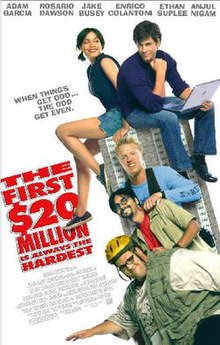The First $20 Million Is Always the Hardest
| The First $20 Million Is Always the Hardest | |
|---|---|

Theatrical release poster
|
|
| Directed by | Mick Jackson |
| Produced by | Trevor Albert |
| Written by |
Po Bronson (book) Jon Favreau Gary Tieche |
| Starring |
Adam Garcia Rosario Dawson Jake Busey Enrico Colantoni Ethan Suplee Anjul Nigam Gregory Jbara |
| Music by | Marco Beltrami |
| Cinematography | Ronald V. Garcia |
| Edited by | Don Brochu |
| Distributed by | 20th Century Fox |
|
Release date
|
June 28, 2002 (U.S.) |
|
Running time
|
105 min. |
| Language | English |
| Budget | $17,000,000 |
| Box office | $5,491 |
The First $20 Million Is Always the Hardest is a 2002 film based on a novel by technology-culture writer Po Bronson. The film stars Adam Garcia.
Garcia stars as Andy Kasper, a man who gives up his cushy marketing job to do something more fulfilling. He gets himself hired at LaHonda Research Institute where Francis Benoit (Enrico Colantoni) assigns him to design the PC99, a PC to sell for $99. He moves into a run-down apartment building where he meets his lovely artist next-door neighbor Alisa (Rosario Dawson), and puts together a team of unassigned employees: Salman Fard (Anjul Nigam), a short, foreign man with an accent who is hacking into CIA files when Andy meets him; Curtis "Tiny" Russell (Ethan Suplee), a massively obese, anthropophobic man; and Darrell (Jake Busey), a tall, blond, pierced, scary, germophobic, deep-voiced man with personal space issues who regularly refers to himself in the third person.
The team finds many non-essential parts but cannot come close to the $99 mark. It is Salman's idea to put all the software on the internet, eliminating the need for a hard drive, RAM, a CD-ROM drive, a floppy drive, and anything that holds information. The computer has been reduced to a microprocessor, a monitor, a mouse, a keyboard, and the internet, but it is still too expensive. Having seen the rest of his team watching a hologram of an attractive lady the day before, in a dream Andy is inspired to eliminate the monitor in favor of the cheaper holographic projector. The last few hundred dollars comes off when Darrell suggests using virtual reality gloves in place of a mouse and keyboard. Tiny then writes a "hypnotizer" code to link the gloves, the projector, and the internet, and they're done.
...
Wikipedia
